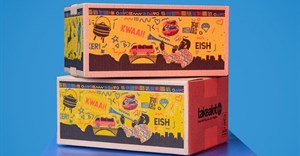Trending
Elections 2024
Jobs
- Pouch Machine Operator Johannesburg
- Sales Representative West Rand
- Fabric Weaving/Looming QC Technician Ga-Rankuwa
- Artwork Layout Artist - Sublimation and Display Johannesburg
- Front Counter Assistant Johannesburg
- Junior DTP Operator Johannesburg
- Litho Sheet Fed Machine Minder Johannesburg
- Accounts/Inventory Clerk Johannesburg
- Printing Sales Account Executive Johannesburg
- Sales Executive/Design and Display Industry Johannesburg
Print could help build the credibility of SA's e-commerce giants

Print is still seen as a pillar of credibility. That’s why Facebook ran a series of print adverts in UK publications earlier this year to educate users on how to spot fake news. This is perhaps odd in light of the fact that research reveals UK readers find their print publications least credible of those in all European Union (EU) countries. That said, print still outshines the internet and social media as a credible news source, even in sceptical Britain.
Facebook tells UK users how to spot fake news in full-page print ads https://t.co/C23fAa9y5e pic.twitter.com/b0fHttNcvq
— The Verge (@verge) May 14, 2017
Which media is most credible according to EU survey
The EU measures the trust of media in an annual survey. Simplifying the results this year, but maintaining the necessary relationship of net trust to positive trust for a true reflection of which media is most credible, radio trumps TV in most EU countries (chiefly Germany, UK, and Italy). Print media comes in second in France and Spain and third in other EU countries. Internet scores are lowest in most countries and net internet scores are all negative because more people say they do not trust the internet versus those who do trust it as a news source. Except in Italy. In Italy, they think it’s fine.
Social media scrapes the bottom of the barrel by scoring even lower than the internet. But this is not surprising to many South Africans. Omni-channel marketing offers obvious benefits over silo marketing in a world where people use several channels to interact with brands. And print clearly remains a key component of the winning mix as a viable contender for engendering credibility and building trust with customers.
This effect is not limited to advertising in existing print media. According to digital outlet PrintPower.com, Amazon, Apple, LinkedIn, Expedia, and Uber have marketed their businesses in traditional print. Airbnb, however, printed its own magazine. A fashion website, Net a Porter, also launched a glossy magazine and now sells more than 170,000 copies every month.
Why UK readers might find print publications least credible
And the EU’s Trust in Media 2017 report also reveals perhaps an obscured truth as to why print serves its digital persecutors so well. While the report divulges that UK readers find their publications least credible, it suggests the cause is: “…due to the steady decline in readership and perhaps the quality of some titles.”
Could it be referring to the scandals that rocked Fleet Street, unsettled Rupert Murdoch, and saw the closure of at least one prominent title, News of the World? The investigations ran from 2005 to 2007. Several publications were accused of phone hacking, bribing the police, and several other unethical practices. Many high-profile people resigned, including a chief of police. Advertiser boycotts led to closure of News of the World but also in its stable, ultimately owned by media mogul Rupert Murdoch, were The Sunday Times, The Times, and The Sun, infamous for its internet-like sensationalism that undermined media credibility.
Channel 4 News later published a related tape in 2013 that purported to reveal Murdoch claiming phone hacking was part of the culture of Fleet Street. The UK media clearly has an issue with credibility less pronounced elsewhere in the EU.
Local digital organisations cling to online marketing channels
Yet, even in the UK where print credibility is arguably at an all-time low, Facebook perceived its benefits for its fakery identification campaign.
I looked for examples in our own country of organisations following this trend. I found instead that Auto Trader has ceased its print version entirely and is now exclusively online. Takealot.com is a well-known digital brand that’s even used its success to consume Kalahari and other digital brands. Yet I found no printed marketing materials for it (nor any others for that matter) in The Star, The Sunday Times, The Citizen, The Saturday Citizen, nor even in magazines such as Drum and You. I did note that it markets via multiple channels that include the web, an app, and a digital newsletter as well as through partner channels like those operated by Discovery.
So, while local digital organisations apparently cling to their online refuge their offshore counterparts have invested, some more heavily than others, in using combinations of traditional print media placements, going so far as publishing their own print platforms. All in the name of credibility, quality, trust. Clearly, it’s worth something in a world awash in the turbulent waters of sensationalism and fakery. And South Africa’s own giants of e-commerce may do well to mimic their successes.






















